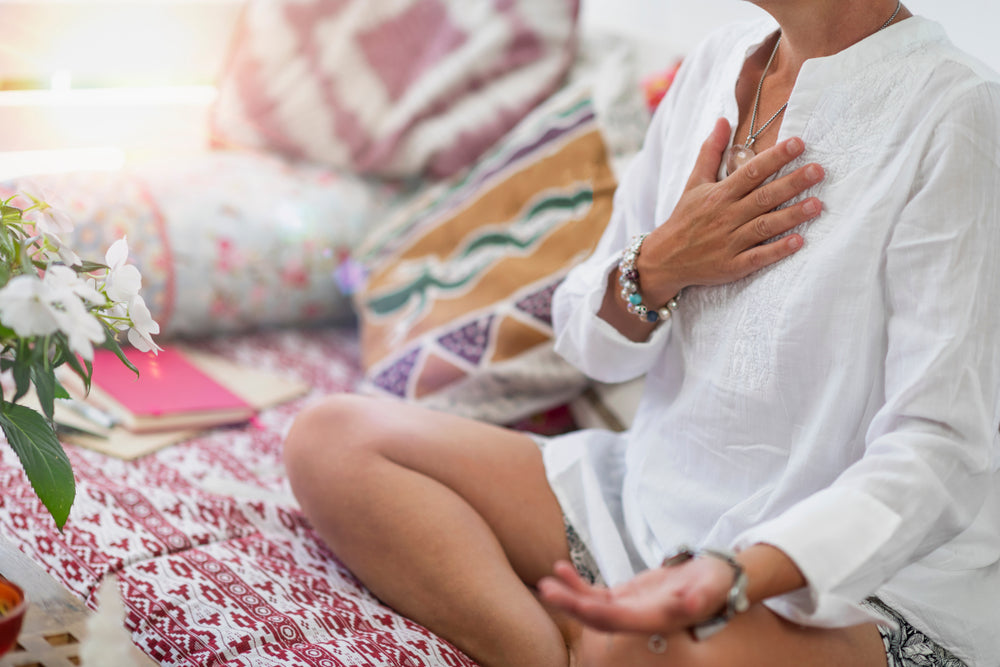Spirituality and Longevity: Does Believing in “Something Bigger” Help You Live Longer

Spirituality has been humankind’s guiding North Star for millennia. This idea that we are connected to something bigger than ourselves has influenced nearly every aspect of our lives, from cultures to traditions to scientific quests.
Now, modern researchers have found that spirituality is more than a cultural practice—there are key correlations between spiritual practices and improved longevity.
So, how can spiritual practices help you live well for longer, and where should you start?
What Does Spirituality Really Mean?
No, you don’t have to join a religion or attend Burning Man to be “spiritual.” (Although both can be considered spiritual practices.)
Spirituality is a broad concept that describes a deeply personal sense of connection to something greater than oneself. Being “spiritual” involves seeking purpose and meaning in life, exploring the inner self, and recognizing the interconnectedness of all living beings.
While spirituality often overlaps with religious beliefs (and you may find your spirituality inspired by a certain religion), it is not limited to any specific faith.
What Is a Spiritual Practice?
There is no set rule on what makes a practice spiritual. It’s more about how an activity makes you feel. In general, a spiritual practice can be any activity or ritual where you can cultivate a deeper connection with your inner self, others, nature, or a higher power or consciousness.
Here are a few examples:
- Meditation and mindfulness practices
- Breathwork
- Prayer
- Gratitude journaling
- Rituals and ceremonies
- Mantras and affirmations
- Acts of kindness or volunteering
- Community-driven exercise programs like CrossFit or SoulCycle, or a favorite yoga class
- Community, hobby, or support groups
The Science Behind Spirituality’s Benefits and Longevity
Spirituality in all forms plays a major role in improving longevity. But how? Here’s what the science says about the benefits:
Reduced Stress Levels
Engaging in spiritual practices, such as prayer or meditation, is associated with decreased stress levels. Studies show that those who meditate regularly (8 weeks of consecutive practice or more) perceive less stress in their lives and feel more empowered to cope with challenges. Increased resilience to stress leads to better hormone balance, reduced inflammation, and reduced risk of longterm health issues.
Social Support
While any chosen spirituality practice can be beneficial to your health, practicing activities in a group or community setting makes the experience more powerful. Being socially connected and having a strong support network has been linked to better health outcomes and longer life.
Enhanced Positive Emotions
The better we feel, the longer we live—at least, that’s what the research shows. According to a University of California San Francisco study, “Positive emotions predicted increases in both resilience and life satisfaction” and “happy people become more satisfied not simply because they feel better, but because they develop resources for living well.”
Engaging in spiritual practices is one of the most reliable ways to evoke positive emotions like gratitude, forgiveness, and compassion. And while these practices do make us feel happier in the moment, they also make us feel more satisfied and empowered in our lives, because we know we have a never-ending resource for positivity when we need it.
Promotion of a Healthy Lifestyle
Many spiritual practices encourage healthy behaviors such as regular exercise, a balanced diet, and abstaining from harmful substances. As you spend more time considering how everything is interconnected, treating yourself well feels like less of a chore and more of an honor.
Activation of Endocannabinoid System
The endocannabinoid system (ECS) is a complex network of receptors and cannabinoids produced naturally by the body. This system plays a crucial role in maintaining homeostasis in the body and manages various processes such as discomfort perception, mood, appetite, and immune function. Studies show that spiritual practices (such as meditation, group gatherings, and spending time in nature) activate the ECS and contribute to better health and improved longevity.
Sense of Purpose
One of the most common benefits of a spirituality practice that people report is a renewed sense of purpose and meaning in life. While this alone makes living life more enjoyable, studies also show those who live a purpose-driven life live longer than those who do not feel they have a clear purpose or are connected to something bigger than themselves.
3 Ways to Flex Your Spirituality Muscle
Taking on a spirituality practice is much like trying a new exercise program. It may feel strange at first, but with consistent practice, you’ll start to build new muscles and achieve new goals. Here are a few simple practices that invite spirituality into your daily life:
1. Meditate
Meditation is a powerful tool to build your spirituality practice, as it’s free and can be done anywhere, anytime. If you’ve never tried meditation before, start by sitting comfortably, focusing on your breath, and observing your thoughts without judgment. With practice, you’ll be able to detach from the chaos of daily life and find a sense of peace and centeredness.
Some of us need extra help getting into a calm, meditative state. If that’s the case for you, pairing your mindfulness practice with a CBD supplement can help you reduce stress more effectively and get more out of every session.
2. Practice Gratitude
Practicing gratitude shifts your focus from what is lacking to what you already have. It can be as simple as jotting down three things you are grateful for each day, writing thank-you notes to people who make your life better, or saying a gratitude mantra throughout the day. Over time, you'll notice that your perspective naturally shifts and you'll easily find joy in the simple things.
3. Exercise
You likely don’t need reminding that regular exercise is key to a long and healthy life. But did you know that sweating it out can be a powerful spiritual practice in itself? Yoga is particularly spiritually charged, as it combines physical movement with breathwork and mindfulness. Walking, hiking, or jogging in nature is another great choice, as you’ll connect to both your body and the natural world simultaneously. But, any physical activity you enjoy can be a spiritual practice.
From research studies to lived experiences, we know that spirituality positively impacts our health and ultimately contributes to a longer, more fulfilling life. As you find your own path, remember that spirituality is a personal journey. Be patient with yourself, and enjoy the process of exploring and deepening your spiritual practice.

Newsletter signup
Join the Joy Organics Family
Sign up and get updates on new products, as well as special coupons and discounts.
testimonials
What Our Clients Say
“This is a company that truly cares about its customers and providing the best CBD products currently available on the market.”










Join In On The Conversation
Your email address will not be published. Required fields are marked *
Comments will be approved before showing up.